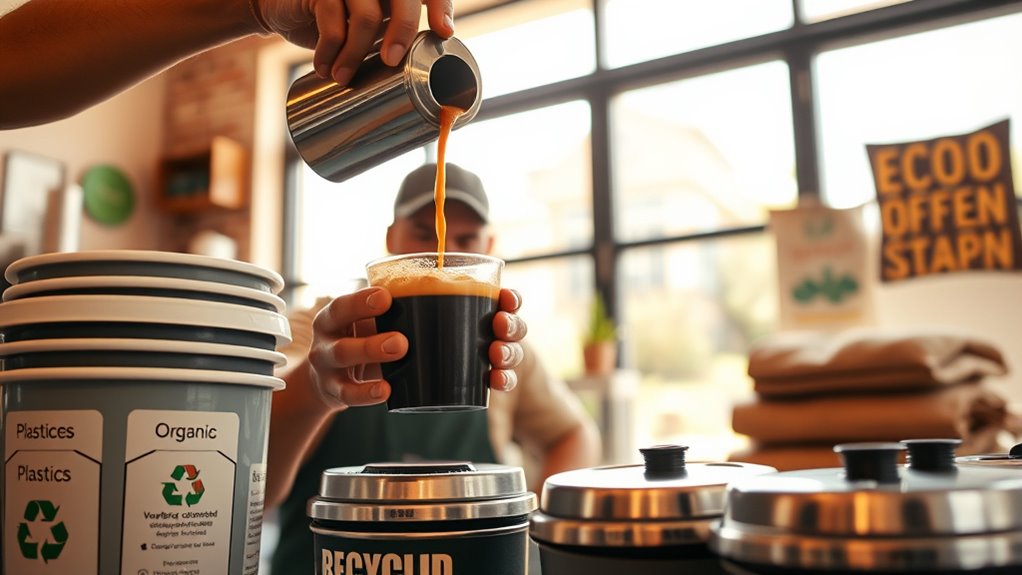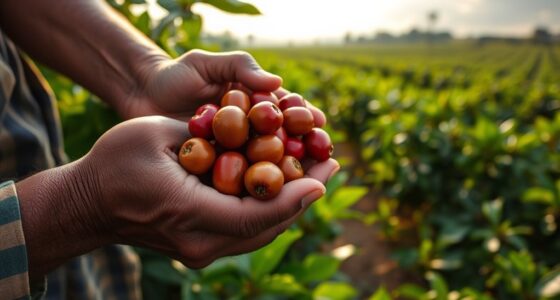Recycling in the coffee industry helps you reduce waste and support sustainability by turning used coffee grounds into useful products like compost, biofuels, and skincare. It also means less waste ending up in landfills, which lowers harmful methane emissions and cuts the industry’s carbon footprint. Many cafes and producers are adopting recycling practices with the help of waste management services, making the whole process more efficient. If you want to explore more ways to make an impact, keep exploring how recycling can transform your coffee habits.
Key Takeaways
- Recycling coffee grounds reduces landfill waste and methane emissions, supporting environmental sustainability.
- Used coffee grounds can be composted to improve soil health and promote agricultural sustainability.
- Innovative recycling methods convert coffee waste into biofuels, fire logs, skincare products, and construction materials.
- Waste management services assist coffee businesses in implementing recycling processes and creating new revenue streams.
- Promoting recycling efforts helps decrease the carbon footprint of coffee production and consumption globally.

Recycling in the coffee industry is gaining importance as more people recognize the environmental impact of waste coffee grounds and disposable cups. Every year, over 500,000 tonnes of waste coffee grounds are sent to landfills in the UK alone, contributing markedly to waste management challenges. Despite the vast amount of coffee consumed globally, only about 0.25% of coffee cups are recycled, highlighting the need for more sustainable practices within the industry.
Over 500,000 tonnes of coffee grounds are landfilled annually in the UK, highlighting urgent sustainability challenges.
By focusing on used coffee grounds, the sector can make meaningful strides toward waste reduction and support a circular economy, where waste is repurposed into valuable resources.
One of the most effective ways to recycle used coffee grounds is through composting. These grounds are rich in nitrogen, making them an excellent addition to compost heaps that enhance soil health. When properly composted, coffee grounds help reduce waste and improve agricultural sustainability. Additionally, recycling efforts can help lower the carbon footprint of coffee production and consumption.
Beyond composting, coffee grounds can be transformed into biofuels, offering an alternative energy source that cuts down reliance on fossil fuels. Converting waste coffee into biofuels not only reduces environmental impact but also promotes waste management solutions that are both eco-friendly and economically viable.
Recycling efforts extend into innovative methods such as wormeries, anaerobic digestion, and manufacturing construction materials. These methods help industries turn coffee waste into products like fire logs or skincare items, further supporting sustainability goals.
Specialized waste management services are now helping cafes and coffee producers to implement these recycling processes effectively. These services facilitate waste reduction while generating new revenue streams, demonstrating how the coffee industry can embrace sustainable practices that benefit both the environment and business models.
The environmental impact of proper recycling can’t be overstated. When used coffee grounds are diverted from landfills, methane emissions—80 times more harmful than CO₂ over 20 years—are appreciably reduced. This helps mitigate climate change effects and promotes a cleaner environment.
Frequently Asked Questions
How Can Coffee Be Recycled?
You can recycle coffee by composting used grounds, which enriches soil naturally. Instead of throwing them away, consider turning grounds into biofuels like biodiesel or bio-coal, reducing landfill waste.
Some companies transform coffee waste into reusable cups, packaging, and even building materials. Proper recycling cuts down methane emissions and soil acidity, helping the environment.
How Much Waste Does the Coffee Industry Produce?
You might be surprised to learn that the coffee industry produces over 23 million tons of waste each year. Used coffee grounds account for most of this, with landfills in the UK alone receiving half a million tonnes annually.
Globally, over 56 billion coffee capsules end up in landfills, and less than 5% get recycled.
This waste profoundly impacts the environment, especially through greenhouse gases like methane.
Can a Coffee Maker Go in Recycling?
Yes, your coffee maker can go in recycling, but it depends on the type. Most traditional drip machines contain recyclable plastic and electronic parts if you separate them properly.
Single-serve machines with capsules or pods may need specialized recycling centers. Check your local e-waste collection or recycling programs, and see if the manufacturer offers take-back options.
Proper recycling helps recover valuable materials and keeps harmful waste out of landfills.
How Many Coffee Cups Are Actually Recycled?
You might wonder how many coffee cups actually get recycled. Sadly, only about 0.25% of over 2.5 billion disposable cups used annually in the UK are recycled.
The main issue is that most cups are lined with plastic or wax, making recycling difficult. Even with dedicated bins, contamination and processing challenges keep recycling rates low, so the majority of your coffee cups still end up in landfills.
Conclusion
By recycling in the coffee industry, you help reduce waste and protect the environment. Every small action, like composting coffee grounds or choosing recyclable packaging, makes a difference. Your efforts support sustainable practices and encourage companies to prioritize eco-friendly solutions. Together, you can create a positive impact, ensuring coffee remains a delicious, eco-conscious enjoy ment for generations to come. So, stay mindful and keep recycling every chance you get!








